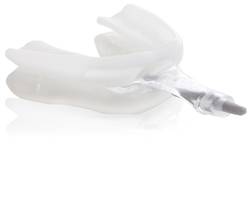Is the MyTap mouthguard the right snoring solution?
Snoring is not a diagnosis and it does not indicate sleep apnea (every time)
For the proper treatment of snoring problems, it is crucial to know of in what ways snoring differentiates from obstructive sleep apnea (OSA). We all know a lot of people snore because we hear about it from the people we know. Going a step further, studies show an estimated 30% to 50% of the U.S. population experiences snoring of some kind.
The problem with excessive snoring (click on the image above for a quick video) is that it can be the cause of other problems including sleep disturbances, marital discord, and waking episodes.
Let’s remember that snoring does not signal the presence of obstructive sleep apnea. When determining whether snoring is tied to OSA, consider these symptoms if they are also present:
- Lengthy Pauses between bouts of snoring
- Choking or gasping following the pauses
- Sleepiness while working, driving, or for an entire day
- Falling asleep when sitting, relaxing anywhere
- Morning headaches
- Irritability
- Depression or personality changes
- A sore throat or dry mouth after waking up
- Frequent urination
- Breathing stoppages episodes
- Short Attention span
- Difficulty remaining asleep
- Decreased sex drive
Oral and dental devices that help in treating sleep apnea
A particular way to treat excessive snoring and sleep apnea is to utilize specifically designed dental or oral devices. These appliances can be useful when correcting mild to moderate cases of obstructive sleep apnea. The good news is that there are numerous options for these dental devices, and an orthodontist or dentist can recommend one that suits the particular needs of the patient and fit it in the safest way.
NOTE: If the reason for sleep apnea has NOT been determined, a mouthpiece may have zero positive effect. Here’s why: some obstructions occur mainly in the airway and do not involve the tongue or jaw, therefore a dental mouthpiece may not work. What to do: see an eye ears nose throat specialist for a specific test to determine the nature of your airway obstruction.
There’s more
One device that can be encouraged for use against the effects of sleep apnea is the mandibular advancement device. This is one of the most widely used dental appliances for the treatment of sleep apnea. It resembles a sports mouth guard in appearance and is useful in forcing the lower jaw down and forward slightly. This offers tremendous help in keeping the airway open, thereby preventing problems in breathing if it is needed
A tongue-retraining device is another option which can be used to effectively treat sleep apnea. This splint holds the tongue in the right position and works to keep the airway open if the tongue has been the primary cause of sleep apnea or a contributing factor. The use of the said device may require regular dental visits because the device requires periodic adjustments or replacements.
Another device that can be purchased separately and without a doctor recommendation is the MyTap, an adjustable mouth piece which mimics the benefits of customized devices. You can learn more here. Or click on the image below.
Dental device benefits for the treatment of sleep apnea
There are reasons why dental professionals are recommending dental devices to help people with sleep apnea.
One is that the mentioned devices are proving to be truly effective against mild to moderate cases of apnea.
Two, the devices are also particularly useful for those who either sleep on their stomach or back, which are restricted or confined sleeping positions when using other means of therapy, such as PAP (Positive Airway Pressure) devices, which blow ordinary air to splint the airway open.
Three, other benefits include improved sleep patterns, reduced snoring, reductions in snoring volume, etc.
PLEASE NOTE:
Pap devices require a sleep study
and sleep doctor recommendations.
In conclusion, it is now clear that treatments options are many when consulting the right medical professional, especially when including your orthodontist, ENT, GP, and sleep doctor. If you are ready to investigate further into an appliance or PAP device, call 1.877.430.2727.
Questions?
Call 1.877.430.2727.
Edited by Bill Bistak B Sc.,SEO/SEM Spc, CRT
CPAP Clinic – hеаlthсаrе аt уоur hоmе
We ѕеrvе Grеаtеr Tоrоntо Area іn Cаnаdа.
Cоntасt: 1-877-430-CPAP(2727) or іnfо@CPAPClіnіс.са
Looking tо rent CPAP іn Tоrоntо? Thеn vіѕіt CPAPClіnіс.са аnd сhооѕе from a wide rаngе of CPAP nаѕаl masks in Tоrоntо аnd CPAP nаѕаl ріllоwѕ іn Tоronto

